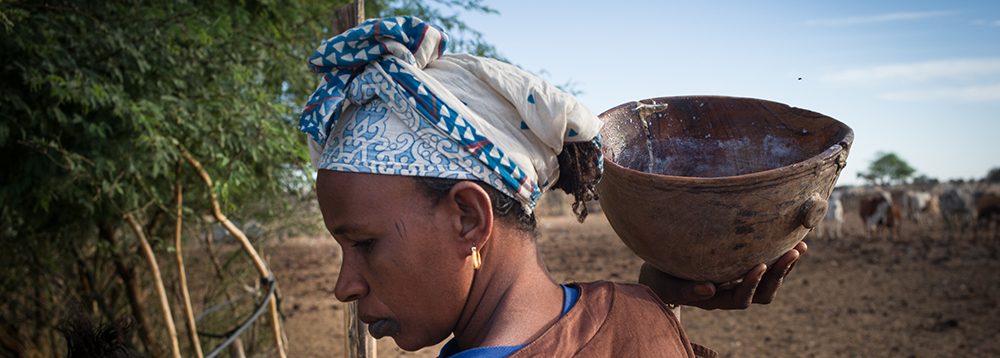The Government of the Principality of Monaco has been a partner of GRET since 2010 and in this latter part of 2020 is confirming its commitment to vulnerable populations in Africa via funding for six GRET projects in various domains, such as healthcare, nutrition and food security.
Monegasque cooperation for development and GRET share an inclusive vision rooted in territories, and have been developing trustworthy partnerships for more than ten years, with a view to fighting inequalities as per the first eight UN Sustainable development goals (SDGs). This partnership focuses in particular on healthcare, food security, nutrition and capacity-strengthening in Africa, via six projects with a total funding of 731,828 euros in 2021.
Greater resilience for vulnerable populations
While one of GRET’s main objectives is centred around reduction of vulnerability for women, men and ecosystems faced with climate, environmental, social or economic shocks, Monegasque development cooperation is supporting several projects aimed at strengthening the resilience of populations.
The project for implementation of universal health cover in Ile Sainte-Marie in Madagascar, launched in 2020 in partnership with the World Health Organisation, the Universal health coverage implementation support unit, the Malagasy Ministry of Public Healthcare and GRET, aims to improve access to healthcare for the most vulnerable inhabitants on the island. More specifically, GRET will ensure implementation of a citizens’ observatory, with a view to coordinating awareness-raising activities, staff training, supply of equipment and materials, rehabilitation of healthcare infrastructures and the implementation of a membership fund for the most vulnerable sections of the population. Thanks to this, more than 25,000 inhabitants on the island will benefit from this universal health coverage, as well as improved availability and quality of healthcare provided, thereby reducing individual and collective health risks.

In addition to these activities to strengthen healthcare, nutrition, more particularly maternal and child nutrition, lies at the core of the collaboration between GRET and the Government of Monaco.
Monegasque development cooperation has been supporting GRET’s Nutridev programme since 2017 and is involved in projects such as Support for promotion of infant and young child feeding services in the Gorgol and Brakna regions in Mauritania, the project to support food fortification in Niger, and the Penim and Tambatra projects in Madagascar. These projects contribute to achieving SDG 3 (Health and well-being for all) and SDG 2 (Eliminate hunger and ensure food security), and more specifically its target 2.2, i.e. “end all forms of malnutrition, particularly in children under 5 years of age and address the nutritional needs of pregnant and lactating women”. They are also part of Monegasque development cooperation’s commitment in terms of child nutrition, one of its six key programmes. These projects aim to improve infant, young child, pregnant and lactating women feeding practices in two regions of Mauritania, ten departments in Niger, two cities (Antananarivo and Toamasina) and two rural communes in Madagascar. By developing local production of fortified foods for women and young children, and attaching particular importance to awareness-raising on nutrition or food and nutrition security in schools, these projects are striving to reduce chronic child malnutrition, which is responsible for delayed growth and serious neurological problems in children who suffer from it.

Stronger means of action
Apart from strengthening the resilience of populations, reduction of vulnerability in human beings and ecosystems affected by shocks is a major focus underpinning GRET’s actions.
Greater inclusion and stronger organisation of agricultural and pastoral value chains are central to empowerment of rural Sahelian populations. Conducted in Burkina Faso since 2019, the GO-IN Burkina project aims to strengthen inclusion of small family farms and small and medium agrifood enterprises in sustainable value chains. More specifically, the project aims to strengthen governance and structuring of cowpea, milk and non-timber forest product value chains. Increasing the capacities of qualitative production, its processing and sale on local markets enables producers to have a higher, more stable income, minimising their vulnerability to climate or economic crises and sustainably improving their socio-economic prospects.

Providing vulnerable populations with the means to determine their future over the longer term is also the objective of the Asstel project, in its third phase in the Dagana region in the north of Senegal since 2019. The main goal of this project is to strengthen pastoral practices by structuring them in a more inclusive, concerted manner. To do this, GRET is supporting the Dagana Milk producers’ cooperative (CPLD) to strengthen its governance and structure collective services to support the milk value chain. It is also working with the Association for the promotion of livestock farming in the Sahel and savanna environments (Apess) to develop solutions to improve livelihoods and food and nutrition security for livestock farming families. It is also participating in efforts for strengthening of interprofessional and territorial dialogue and concertation among stakeholders, on the issues of gender and nutrition in particular.
In all, approximately 1,500 family farms will be supported by the project, either directly or via partners’ services and support (Apess and CPLD) to improve their food and nutrition situation, and ensure sustainable, inclusive income in their territory.
These GRET projects supported by Monegasque development cooperation are all commitments to the most vulnerable groups. Ensuring health, economic, food and nutrition resilience of populations and ecosystems enables men and women to envisage the medium term with greater peace of mind. Support for structuring of agropastoral value chains ensures stability in territories, enabling the people who live in them to have sustainable food and nutrition autonomy.
Lastly, GRET and its teams would like to thank the Government of the Principality of Monaco for its longstanding commitment to the most vulnerable people in societies for the last ten years, and for its prompt reaction in the fight against Covid-19.



